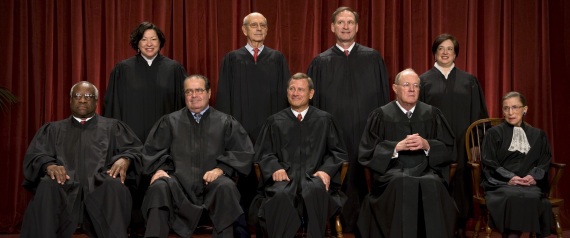Today's Supreme Court decision recognizing the constitutional right of same-sex couples to marry is a milestone in America's journey toward equal citizenship for all, regardless of sexual orientation. And while those of us who support marriage equality are right to rejoice, there remains one thing missing from Justice Anthony Kennedy's opinion: he refused (once again) to say that all laws that discriminate against LGBT people are subject to heightened judicial scrutiny.
For decades, the Supreme Court has held that some aspects of personal identity are not usually a valid basis for treating people differently, including race, sex, and national origin. To protect against those forms of discrimination, the Court insists that laws that use these factors must meet heightened judicial scrutiny to survive. This means that courts reverse the usual presumption in constitutional cases that laws are constitutional. Under heightened scrutiny, laws are presumed unconstitutional and the government is required to show strong reasons to justify the disparate treatment. Prisons can separate prisoners on the basis of race to stop a race riot, but they can't do so for convenience or cost savings.
One of the issues raised in the marriage case was whether laws that discriminate on the basis of sexual orientation should be subject to heightened scrutiny. Although the Supreme Court has invalidated some laws that discriminate against LGBT people, including the Defense of Marriage Act, the Court has consistently refused to identify what standard of review -- heightened or not -- such laws must be subject to. In the marriage cases, the Court, per Justice Kennedy, failed to do so again.
While Kennedy's refusal is easy to overlook in the celebration over marriage, it can have a profound, adverse impact on LGBT people. Lower courts can read Kennedy's opinion in future cases, such as challenges to laws against gay adoption, and say that it doesn't require heightened scrutiny. So long as the government has any plausible reason to justify the distinct treatment of an LGBT individual, the court can uphold the law.
Kennedy's seeming unwillingness to require heightened scrutiny -- he's done it now in 4 major gay rights cases -- could make it harder for LGBT people to fight discrimination in the marketplace, such as refusals of service by wedding cake bakers or florists. The Court in Hobby Lobby said that businesses have religious rights and can, on that basis, refuse to follow generally applicable laws. Yet the Court also said that religious freedom wouldn't justify racial discrimination because the government has a compelling reason to prevent such treatment. If the Court had in the marriage cases held that heightened scrutiny applied, it would have sped the way to recognizing a compelling governmental interest in combatting LGBT discrimination.
The significance of any Supreme Court case is largely in how it influences the next case to come along. Justice Kennedy had a chance to make it much harder to justify anti-LGBT discrimination in future cases. That he didn't gives the silver cloud of the marriage equality decision a slightly dark lining.
Original Article
Source: huffingtonpost.com/
Author: Adam Winkler
For decades, the Supreme Court has held that some aspects of personal identity are not usually a valid basis for treating people differently, including race, sex, and national origin. To protect against those forms of discrimination, the Court insists that laws that use these factors must meet heightened judicial scrutiny to survive. This means that courts reverse the usual presumption in constitutional cases that laws are constitutional. Under heightened scrutiny, laws are presumed unconstitutional and the government is required to show strong reasons to justify the disparate treatment. Prisons can separate prisoners on the basis of race to stop a race riot, but they can't do so for convenience or cost savings.
One of the issues raised in the marriage case was whether laws that discriminate on the basis of sexual orientation should be subject to heightened scrutiny. Although the Supreme Court has invalidated some laws that discriminate against LGBT people, including the Defense of Marriage Act, the Court has consistently refused to identify what standard of review -- heightened or not -- such laws must be subject to. In the marriage cases, the Court, per Justice Kennedy, failed to do so again.
While Kennedy's refusal is easy to overlook in the celebration over marriage, it can have a profound, adverse impact on LGBT people. Lower courts can read Kennedy's opinion in future cases, such as challenges to laws against gay adoption, and say that it doesn't require heightened scrutiny. So long as the government has any plausible reason to justify the distinct treatment of an LGBT individual, the court can uphold the law.
Kennedy's seeming unwillingness to require heightened scrutiny -- he's done it now in 4 major gay rights cases -- could make it harder for LGBT people to fight discrimination in the marketplace, such as refusals of service by wedding cake bakers or florists. The Court in Hobby Lobby said that businesses have religious rights and can, on that basis, refuse to follow generally applicable laws. Yet the Court also said that religious freedom wouldn't justify racial discrimination because the government has a compelling reason to prevent such treatment. If the Court had in the marriage cases held that heightened scrutiny applied, it would have sped the way to recognizing a compelling governmental interest in combatting LGBT discrimination.
The significance of any Supreme Court case is largely in how it influences the next case to come along. Justice Kennedy had a chance to make it much harder to justify anti-LGBT discrimination in future cases. That he didn't gives the silver cloud of the marriage equality decision a slightly dark lining.
Original Article
Source: huffingtonpost.com/
Author: Adam Winkler

No comments:
Post a Comment